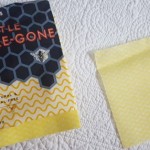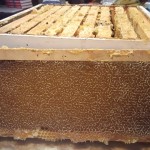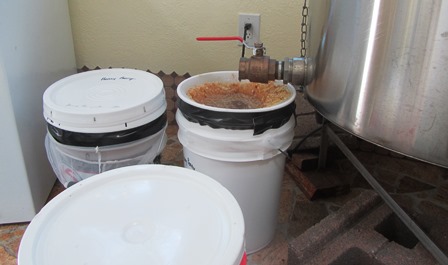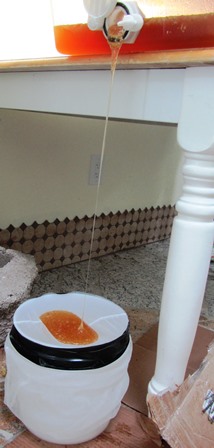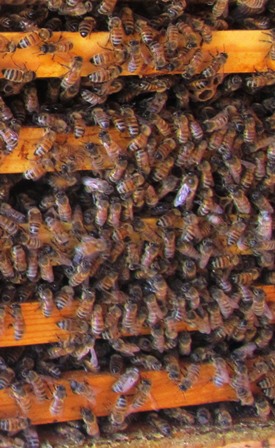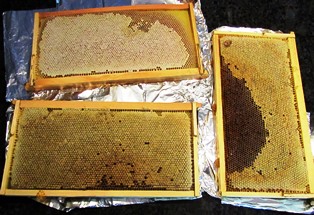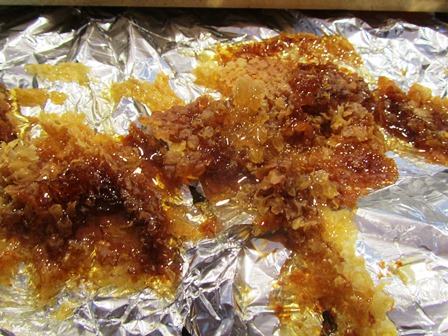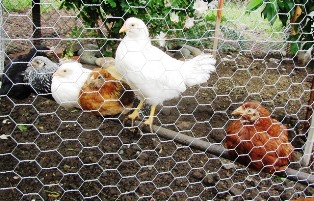Autumn Brings A Honey Harvest and Hive Treatment
Harvesting sweet-tasting, amber-colored honey from my hives has become an autumn ritual. This past Sunday, my beekeeper neighbor and I opened, inspected, and removed ten frames of honey from the one hive I have left.
The other hive succumbed to stress, a hive beetle infestation, and a steady march of ants. This despite me keeping my hives (and the apiary) pristine, dry, and facing the sun.
I found a beetle (no larvae) in the super we removed from the hive box when I scraped the frames clean of wax and bee glue. The tiny black insect had established itself in a crack under a plug of wax. Bees can’t sting through the beetle’s hard shell.
Without a powerful way of combating an infestation of beetles, the hive becomes stressed.Thank goodness, my neighbor had just the treatment to eliminate any other unseen beetles from my hive box.
Beetle Bee Gone sheets are an all natural and chemical-free method for treating hive beetle. Bees munch on the sheet that then becomes a fuzzy trap that ensnares the beetles. The beetles die.
In cool weather, which is what we have now, the hive beetle moves to the interior, above the brood, and/or under the hive cover. When the weather gets warmer, the pests move downward and so the placement of the sheets must be moved down.
My neighbor also inserted under the hive box lid a small plastic trough (as long as a pencil) with holes. He poured vegetable oil into the trough until it was half full. This, too, is a natural treatment against the hive beetle. The pests drown.
I’m optimistic that these treatments (along with others I’m using for mites) will keep the hive protected over winter so that in spring, I’ll get a new swarm to grow my diminished colony.
With the bees tended to, I turned my attention to the honey harvest. In all, the single super of ten frames produced roughly three gallons of honey once I’d prepped the frames and put them in the extractor. That’s more than enough honey to get my family through the winter and to present as gifts to friends along with jars of fruit jams and homemade sweets come Christmas.
_________________________________________________________________
If you enjoy reading about backyard beekeeping, caring for chickens, or growing organic vegetables, check out my Henny Penny Farmette series of books. All are available through traditional and online bookstores. To see more, click on the link.
Pulling Honey–A Bee-eautiful Sight to See
Nothing compares to the reward of pulling honey from a hive when you are a beekeeper. Over the last two days, this is what I’ve done with the help of my world-class beekeeper neighbor who knows more about keeping honeybees than anyone I’ve ever met.
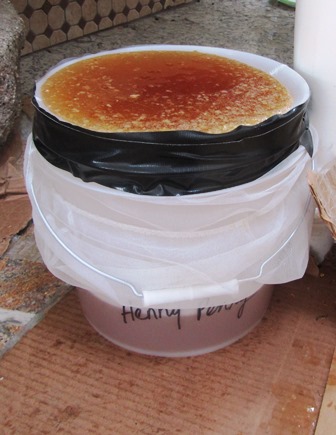
Pictured is a Henny Penny Farmette honey bucket with strainer taped on and bits of wax in the honey on top
His wife helped me scrape off the bee glue from each frame and then open the capped cells (a must) before draining the honey. We then used their machine that can spin twenty frames at a time. It has an electric motor and a control to increase or decrease the speed. Use slow speed to begin and then when the frames grow lighter, you increase the speed.
In all, I spun four hive boxes full (ten frames each), except for one box that had fewer because we left two frames behind in the apiary. They still had babies in them.
We taped fine-mesh filters over the tops of several five-gallon buckets. To spin the honey out of the first eighteen frames took many hours, from noon to about ten o’clock at night. We left the machine spigot open all night to allow the draining to continue into the bucket. The filters caught bits of wax and even the occasional dead bee, ensuring the honey would be perfectly clean and ready to bottle.
I drained honey from the ten frames in each of my hive boxes–two of my hive boxes held the large frames and two held smaller frames. In all, we spun and drained enough honey to fill three five-gallon buckets and about one-fourth of a two and one-half gallon bucket.
Not a bad yield for a fairly young hive and during summer in a drought year when pollen-laden flowers are not be as plentiful. It’s a bee-eautiful sight to see!
A False Swarm . . . Sort Of
When I heard my neighbors banging on a pan with a wooden spoon, I sprang into action. It is what we do when a honeybee hive swarms.
As it turned out, my bees had swooped from the hive with their queen into the front yard, past the plum tree and were circling above the blood orange. My neighbors, who were in their courtyard, saw it and began the banging to confuse the bees so they would alight close to their home.
I ran out and, with direction from my beekeeper neighbor, placed the hive near the orange tree. I’d already placed eight frames with wax and my neighbor brought over two with honey on the comb. All seemed to go as planned. We shook the tree and the bees dropped into the prepared hive.
My neighbor went home, and I went back to my computer and the novel I’m writing. Thirty minutes later, the bees were swarming again. I ran out and banged on the pan. They settled down. All seemed well, except for ants that had been in the orange tree and now were in the hive box.
Around nine o’clock at night, I sprayed the outside of the hive with Windex and wiped it with paper towels. I repeated the procedure around the perimeter of the box, replaced the lid, and carried the hive box back to the apiary believing all would be well. It wasn’t.
This morning, I ran out and suited up in my beekeeper’s outfit and gloves, opened the new hive box, and looked in. To my dismay, all the bees were gone.
My neighbor later told me over coffee that the bees had likely returned to their old hive as small swarms sometimes do. So . . . I suppose I may be repeating this whole scenario at some point in the days ahead. My neighbor reminded me that the weather has been strange, and the weather affects the bees’ behavior.
Uncapping, Draining, and Straining a Frame of Honey
I have frames of honey wrapped in foil in my kitchen freezer. These frames haven’t yet been uncapped, drained, and strained for bottling.
Since the weather on the farmette has turned springlike, I can’t put this chore off any longer. Those frames have to come out of the freezer. They’re from late October. I’d wrapped them in aluminum foil and froze them until I could find time to work with them.
Once a frame had defrosted, I needed to open the cells of wax, capped by the bees. Opening capped cells becomes easier if you use a hot knife. I run mine through a gas burner and wipe frequently. After the cells are opened on both sides of the frame, I stand the rectangular wooden frame in a freshly washed two- or five-gallon bucket and cover the bucket with plastic wrap until the honey drains out.
Then, of course, the honey collected needs to be filtered. I use a bucket over which I’ve secured a thin painter’s net for straining paint. As the honey drains through, I twist around a large wooden spoon to tighten. Eventually, all that is left in the net strainer are pieces of wax. Many backyard beekeepers run honey through the straining process twice before bottling.
Using a coat hanger, I hang the frames (from which I harvested the honey) in a tree near the apiary. The bees will do the work of removing all traces of honey, leaving only wax. At this point, I’ll freeze the frames before reusing them.
This is a very old fashion way of harvesting honey. There are modern appliances and other tools, including an electric hot knife and honey extractor machines, that serious beekeepers can use. But the old ways, although more laborious, still work.
Gunshot Triggers Howls and Cackles in the Hood
Farm life isn’t always quiet. Night before last, a shot rang out around 11:00 p.m. It happened after some people in the neighborhood had engaged in a running argument, lasting hours.
My husband and I heard the arguing during our romantic dinner on the patio. His birthday is tomorrow and we celebrate birthdays all week, you see.
Hubby said he knew the sound of gunshots when he heard them. He was even more certain he’d heard the words, “We got to get out of here!” I was tempted to dive under the bed because people on the run with guns . . . well, that could be dangerous.
In the dark, you don’t know what has happened. I write mysteries. I’m thinking, “is there a body on the adjacent property?”
Three uniformed police officers arrive with nightsticks in their duty belts and guns in their holsters. With their flashlights drawn and turned on, they searched for a way into fortress that the neighbor has built or a means to see behind the tarps the neighbor has strung to hide his backyard and sheds.
Over the barking of the neighbor’s pit bull, I heard one officer tell the others, “This is like the Beverly Hillbillies. We’re notifying Code Enforcement.”
Glad it wasn’t our place they were talking about. We’ve been renovating . . . but neatly. Still, there’s the unfinished porch, the pile of lumber . . . .
I watched the erratic beams of their flashlights as they searched. Then . . . here they come, lights bobbing, down our driveway. They want to see if they can penetrate the fortress of the Beverly Hillbillies from another direction. Our house is in close proximity.
My husband went searching for a ladder. Call me silly, but I thought it would be the tall, thin officer, who would climb up. No, that would be too logical. It was the short, chunky one scaling into the heights, disappearing into the elm tree. Did I mention the tree has an almost impenetrable canopy in summer? Not surprising that he couldn’t see anything.
The officers decided on a look-see from the rear. My hubby guided them through a field, past the apiary and chicken house.
Roosting chickens are usually quiet. No doubt, you’ve heard the expression, “Going to bed with the chickens, rising with the rooster.” To say my hens were alarmed might be an understatement. They’d been roused from their slumber and cackled like there was no tomorrow. I realize there’s a bit of irony in the fact that our place is called the Henny Penny Farmette after Chicken Little’s story about the acorn falling on her head. This could have been the sky falling. They cackled like it was.
The deafening cackles agitated the neighbor’s pit bull, whose incessant barking got all the dogs in the hood howling. A fire engine shot by, sirens blaring. I took an aspirin, waited for my husband to return and the officers to leave.
Back in bed, who could sleep? I worried about when about when Code Enforcement might show up to cite the Beverly Hillbillies. Would the officers look over the fence and cite us as well? Code Enforcement aside, a gun-toter could hide behind our pile of porch lumber. We gotta get that porch finished.
But, like I said, it’s my husband’s birthday. He’s feeling romantic this week and not easily pushed. See my conundrum?
 Facebook
Facebook Goodreads
Goodreads LinkedIn
LinkedIn Meera Lester
Meera Lester Twitter
Twitter






